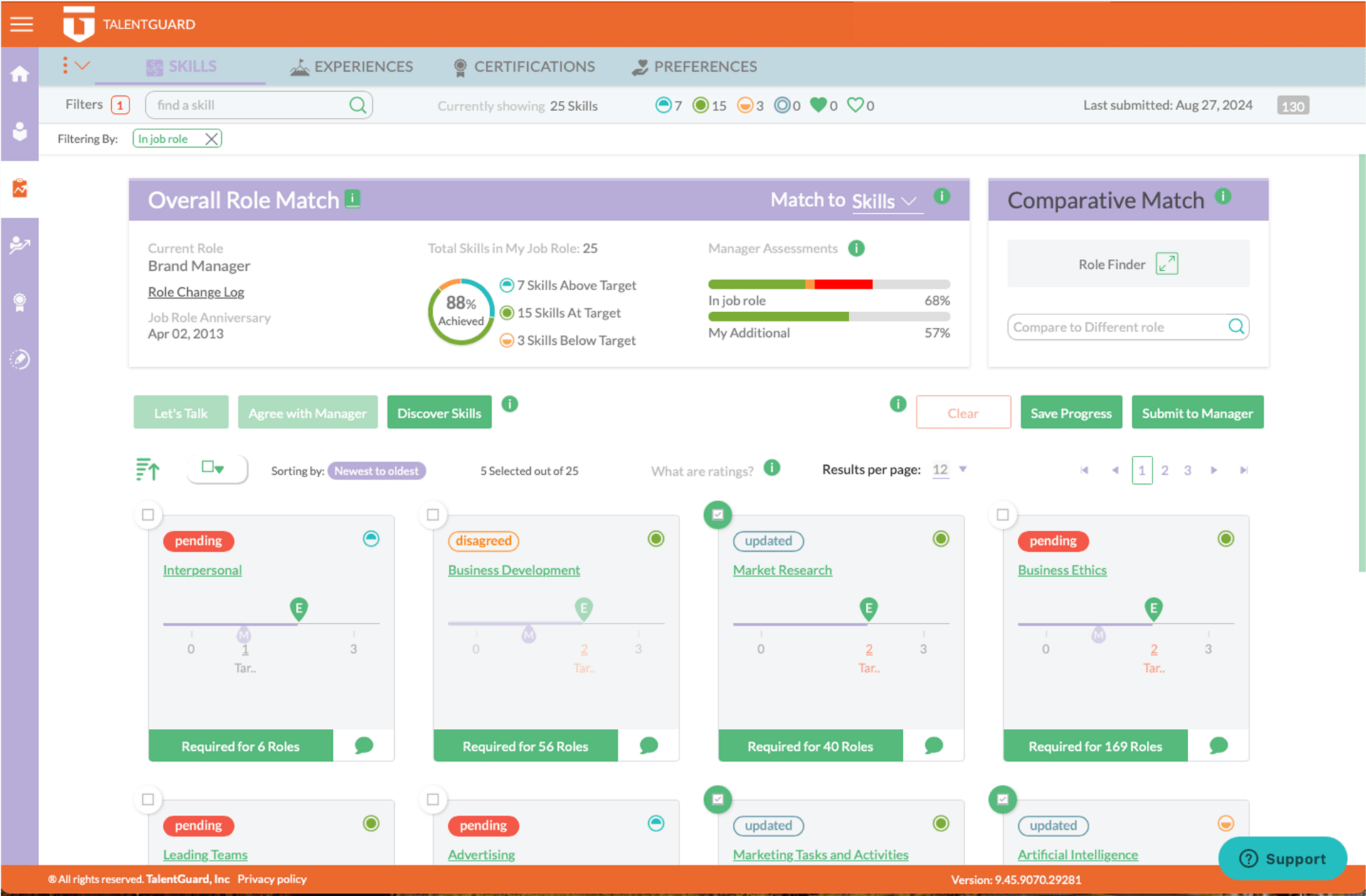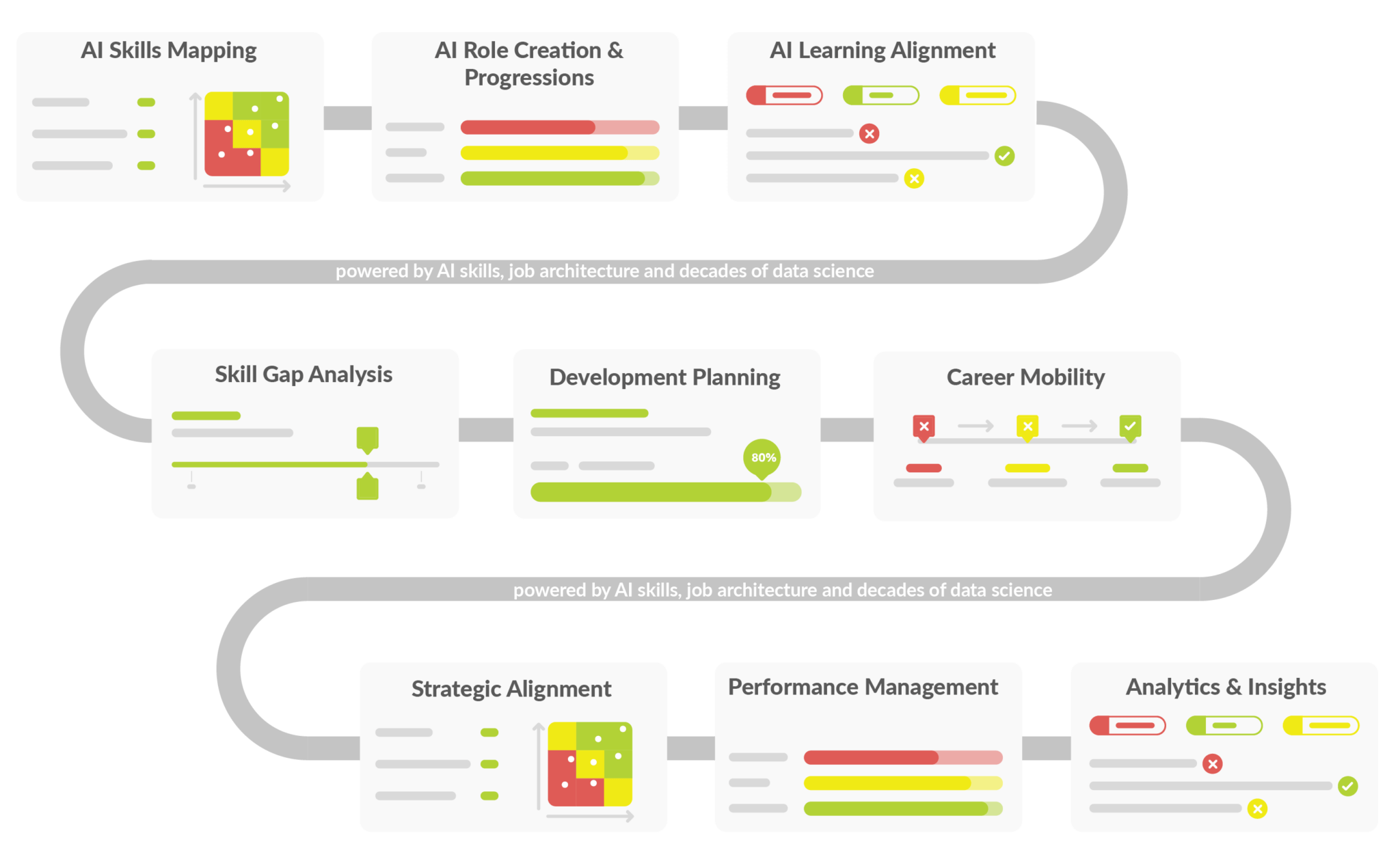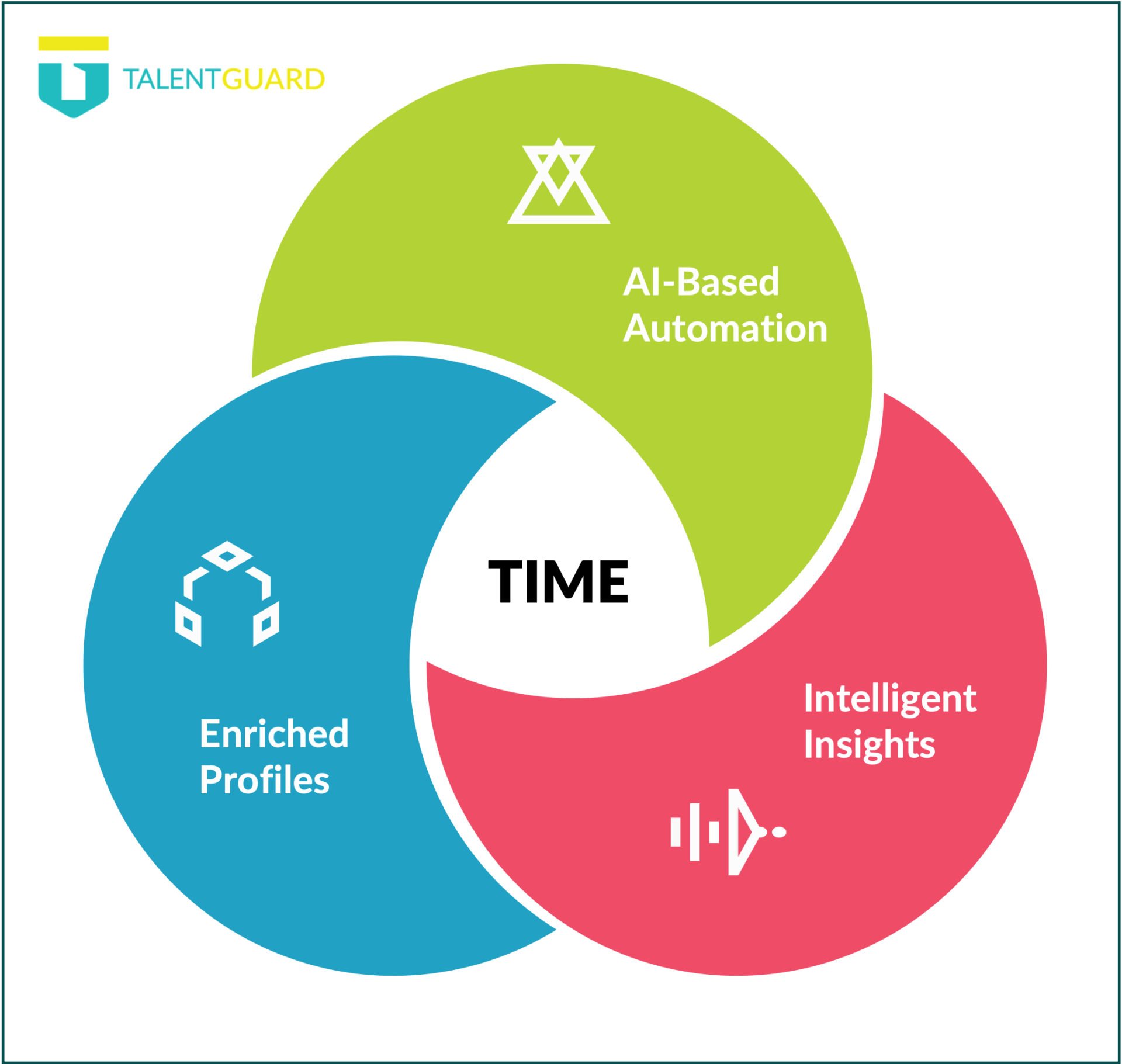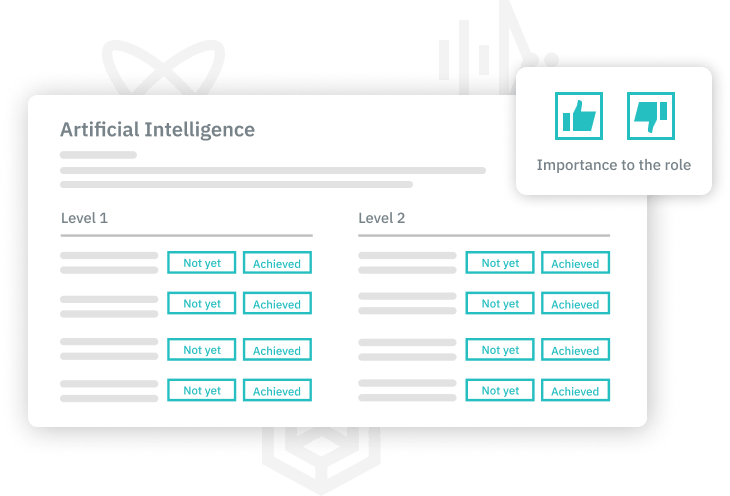All-in-one Employee Development Platform by TalentGuard
All-in-one employee development is essential for driving business success and achieving long-term growth, especially for mid-size businesses aiming to stay competitive in today’s market. With the right employee development platform, companies can maximize their workforce’s potential, align growth with business objectives, and foster an engaged, productive team. TalentGuard’s all-in-one employee development platform is specifically designed to help small businesses enhance and streamline their approach to employee growth, making it easier to cultivate and track the progress of their most valuable asset: their people.
Challenges Facing Employee Development
Many managers encounter several obstacles in trying to nurture their workforce. Traditional, outdated systems often result in a fragmented and inefficient approach to employee growth, making it difficult to get a complete view of employee skills, progress, and alignment with company goals.
A significant issue lies in disjointed development tools. Relying on multiple, unconnected platforms to manage development efforts—such as separate tools for skill assessments, training programs, and performance tracking—makes it difficult to create a unified development strategy. Without a centralized system, managers face challenges in accessing all necessary information about an employee’s growth, resulting in inefficiencies and missed opportunities for targeted development.
Another common problem is the reliance on manual progress tracking. Many organizations still track employee development through spreadsheets or paper-based systems, which wastes time, increases the risk of errors, and creates an administrative burden. Manually tracking skills and training completion can lead to inaccuracies that affect performance reviews and development plans, making it harder to ensure that employees meet expectations or have the opportunity to grow in ways that benefit both them and the organization.
A third challenge is the lack of alignment between employee growth and organizational goals. For employee development to have a meaningful impact, growth efforts must support the broader objectives of the business. Without a platform that links employee growth with company goals, managers may struggle to ensure that training initiatives and skill-building efforts contribute to organizational success. This disconnect can lead to underutilized resources, wasted development efforts, and a workforce whose potential remains untapped.
| Disjointed Development Tools | Manual Progress Tracking | Limited Growth Alignment |
| Tracking employee progress and skill gaps using separate systems makes it difficult to create a cohesive development strategy. | Relying on spreadsheets or paper-based methods for tracking development and training programs wastes time and risks inaccuracies. | Without a centralized platform, aligning employee growth with organizational goals is tough, making it difficult to measure the impact of development efforts. |
Benefits of an All-in-One Employee Development Platform
Using an integrated platform like TalentGuard’s for employee development offers several advantages. By consolidating all development efforts into a single system, businesses can streamline processes, eliminate redundancies, and create a more cohesive and effective strategy for growth. An all-in-one platform enhances growth initiatives by allowing businesses to increase their skills acquisition rate by over 50%, and the impact of upskilling by 60%, because all employee development data is centralized and easily accessible.
Automation is another significant benefit. TalentGuard’s platform automates scheduling, training, performance tracking, and feedback, reducing manual workloads and improving accuracy. Automated tracking ensures that employee progress and achievements are recorded in real-time, giving managers and HR teams up-to-date information without the need for extensive data entry. This efficiency saves time and resources, allowing managers to focus more on strategic aspects of employee development, such as personalized growth plans and proactive support.
Furthermore, an integrated development platform aligns individual growth efforts with business objectives through tools like gap analysis and benchmarking. By comparing current employee skills with industry standards and internal goals, managers can ensure that growth aligns with the company’s strategic direction. When development aligns with business needs, employee growth directly supports organizational success, making development efforts both impactful and meaningful.
How TalentGuard Supports Employee Development
TalentGuard’s platform is designed to tackle common employee development challenges while providing robust, easy-to-use tools that help managers and employees work together toward continuous improvement. With a centralized management system, businesses can keep detailed records of employee profiles, including skills, qualifications, certifications, and training progress. This consolidated information allows managers to track the development of their team members without having to navigate multiple, disparate systems.
TalentGuard’s platform also integrates with LinkedIn, enabling employees to import their profiles and add relevant skills and experiences directly. This integration enhances the accuracy of skill assessments and provides managers with a comprehensive view of each employee’s capabilities and professional background. Leveraging LinkedIn data in combination with TalentGuard’s AI-powered analytics, businesses gain a deeper understanding of employee potential and can make more informed decisions about training and development needs.
Data security is a high priority for TalentGuard, especially given the sensitive nature of employee growth data. To protect this information, TalentGuard incorporates advanced security measures, such as encryption, to safeguard employee records and prevent unauthorized access. Small businesses can rest assured that their development data is secure, meeting compliance standards while protecting employees’ personal and professional information.

Comprehensive Skill and Competency Assessments
To foster effective growth, TalentGuard offers a variety of skill and competency assessments that provide a holistic view of employee capabilities. These assessments go beyond basic job skills, helping businesses identify key areas for improvement, gauge future potential, and support employees in achieving their career goals.
Skill Type Assessments allow organizations to evaluate both technical and soft skills, such as communication, leadership, and problem-solving abilities. This holistic view of employee skills helps managers understand their teams’ strengths and weaknesses, enabling targeted development strategies.
In addition to general skill evaluations, Job Skills Assessments focus specifically on the competencies required for an employee’s current role. This targeted assessment ensures employees have the tools they need to succeed and helps managers identify any gaps that could impact performance.
TalentGuard also provides Key Skills Assessments to examine critical skills employees have acquired throughout their careers. These assessments provide insight into employees’ long-term development and potential, helping managers identify candidates for leadership or specialized roles.
Aspirational Skills Assessments allow employees to highlight the skills they wish to develop, fostering a culture of continuous learning and personal growth. Employees can set personal development goals, which TalentGuard’s platform then supports through personalized training recommendations.
The platform’s Role-Based Assessments enable employees to compare their skills and competencies against their current job requirements. This feature ensures alignment with organizational expectations and helps employees understand the specific areas they need to improve to advance within their roles.
Explore our Talent Assessment.
Empowering Employee Growth and Supporting Managers
TalentGuard’s platform empowers employees by giving them the tools to actively manage their own growth. Employees can assess their skills against job targets, identify development areas, and regularly check their progress, all of which contribute to proactive career management. By encouraging continuous self-evaluation, TalentGuard helps employees take ownership of their growth, leading to higher engagement and motivation.
For managers, the platform simplifies skill verification and helps align employees’ self-assessments with objective criteria. Managers can easily identify gaps between an employee’s self-perception and actual performance, facilitating a more accurate understanding of capabilities. Additionally, managers can track the status of employees’ skills, allowing for transparent goal-setting and development planning. By providing clear insights, TalentGuard helps managers focus on the most effective growth strategies for each team member, ensuring that development efforts are impactful and aligned with organizational needs.
Why TalentGuard is Ideal for Mid-size Businesses
TalentGuard’s all-in-one employee development platform is particularly suited to small businesses, which often lack the resources to manage multiple development tools or implement complex talent management systems. With TalentGuard, small businesses gain access to a comprehensive suite of development features without the need for a large HR team or dedicated training staff. The platform’s intuitive design and automated processes make it easy for managers to oversee employee development, track progress, and adapt strategies based on real-time insights.
Furthermore, TalentGuard’s data-driven approach to employee growth helps small businesses remain competitive by ensuring their workforce is continually developing relevant skills and competencies. By investing in the growth of their employees, small businesses can increase retention, reduce turnover costs, and create a more resilient, adaptable team.
Start Maximizing Your Team’s Potential with TalentGuard
Employee development is no longer just a benefit; it’s a necessity for companies aiming to thrive in today’s fast-paced, skills-driven market. TalentGuard’s platform not only simplifies the development process but also enables small businesses to cultivate a culture of growth, learning, and improvement. By aligning development efforts with business objectives, TalentGuard empowers employees and managers alike, ensuring that every member of the team contributes to the organization’s success.
Explore TalentGuard all-in-one employee development platform
See a preview of TalentGuard’s platform
Importance of Skills Evolution Tracking
Importance of Skills Evolution Tracking In a dynamic business environment where change is the only constant, organizations must be equipped to adapt swiftly to evolving market demands. One of the most critical aspects of staying competitive lies in how organizations manage talent, particularly by ensuring that employee skills evolve in sync with industry needs. This […]
Talent Management Challenges faced by Leaders
Leaders face critical talent management challenges globally. Key issues, such as bridging skills gaps, maintaining high levels of employee engagement and retention, and making data-driven decisions, are more pressing than ever. As a leader, you may find that traditional talent management tools and processes struggle to keep up with these demands. The right approach to […]
Importance of a Standardized Taxonomy
The importance of a standardized taxonomy is crucial in shaping effective talent management within an organization. This structured framework offers a consistent way to define and categorize job roles, skills, and competencies across departments, providing a common language and aligning employees and leadership with clear expectations. When implemented effectively, a standardized taxonomy enhances talent development, recruitment, […]



